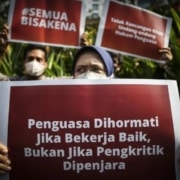
Chair of the Indonesian Democratic Party of Struggle, Megawati Soekarnoputri. Photo by M Risyal Hidayat for Antara.
On February 14, 2024, Indonesia held its presidential, national legislative, and regional legislative elections on the same day. While quick counts by reputable polling institutes show Prabowo Subianto won the presidential election in a landslide, the results of the legislative elections will not be clear until 20 March when, by law, the official result must be announced.
The new president will be inaugurated on 20 October and by that point he will need to announce his new cabinet. If he follows past practice, it will include a mix of technocrats and party representatives from the successful coalition.
However, many of the parties not part of Prabowo’s originally campaign are also expected to join the coalition to access the perks and resources of being in power. After all, Prabowo himself – having run unsuccessfully against Joko “Jokowi” Widodo in the 2019 election – famously joined Jokowi’s cabinet as the Minister of Defence. Even his running mate, Sandiaga Uno, ended up securing a position as Minister of Tourism and Creative Economy – not a bad consolation prize for losing the election.
How did the parties perform?
Prabowo enjoyed a major surge in popularity in the 2024 presidential election, with unofficial counts suggesting he won a clear first round majority – however, polling in the legislative election remained more or less consistent with 2019 figures.
At the time of writing, the Indonesian Democratic Party of Struggle (PDI-P) polled the strongest – winning about 16% of the vote. This was down 2.4% on its 2019 result but still a relatively good result given the weak voter turnout for their presidential candidate Ganjar Pranowo.
The second and third most popular parties both backed in Prabowo Subianto – the Party of Functional Groups (Golkar) won 14% of the vote while Prabowo’s own party, the Great Indonesia Movement (Gerindra), won 12% of the vote. Golkar saw a 3% surge from 2019 which some have attributed to the party’s association with the popular governor of West Java, Ridwan Kamil.
The next three parties were all supporters of the unsuccessful candidate Anies Baswedan – the National Awakening Party (PKB) with 11% of the vote, the National Democrats (Nasdem) with 9% of the vote and the Prosperous Justice Party (PKS) with 7.5% of the vote.
And the last three parties likely to sit in parliament are the National Mandate Party (PAN) with 7% of the vote, the Democrat Party, also with 7%, and the United Development Party (PPP) with just 4%.
The votes of the remaining parties did not pass the electoral threshold of 4% and will simply be voided, which will ensure each qualifying party receives a 1-3% boost in the seats allocated to them.
It is too early to say what the parties will do, however, three could well wind up outside the governing coalition.
The Indonesian Democratic Party of Struggle (PDI-P)
Perhaps the most likely to enter opposition is PDI-P. The largest party, it fielded a presidential candidate pair of its own – Ganjar Prabowo and Mahfud MD – in the 2024 presidential election, but the duo failed to win over voters and ran last.
PDI-P is also the same party that backed incumbent President Jokowo Widodo in 2014 and 2019, only for him to turn around and support Prabowo, securing a place for his son, Gibran Rakabuming Raka, as Prabowo’s vice-president in 2024.
The reason for the split between Jokowi and PDI-P was personal. Megawati believed Jokowi owed her more gratitude for allowing him to run for president under the PDI-P banner. She also feared Jokowi might take control of the party from her and her chosen successor, Puan Maharani.
From Jokowi’s perspective, however, he believed Megawati insulted him over his ten years in power. He also considered Ganjar ungrateful – especially when Jokowi was not informed about Ganjar’s nomination until the morning of his candidacy ceremony, a major slap in the face.
The relationship further degraded throughout the campaign as Megawati accused the President and his administration of irregularities and cheating during the election. In this context, rapprochement is unlikely to occur any time soon, considering both Jokowi and Megawati are famous for holding grudges.
The National Democrat Party (NasDem)
The second party in a position to oppose the government is NasDem. It is a very pragmatic party, led by business tycoon Suryo Paloh, who split the party from Golkar in 2011. NasDem and Golkar were both part of Jokowi’s winning coalition when he ran for the presidency again in 2019.
However, in this election NasDem shifted loyalties, nominating Anies Baswedan as its presidential candidate – most likely to boost its prospects in the Anies’ strongholds of West Java, Banten and Sumatra. This manoeuver incurred the wrath of the president, resulting in corruption investigations and the resignation of two of three Nasdem ministers from Jokowi’s cabinet.
NasDem was unable to substantially increase its share of the vote from 2019. Suryo Paloh has indicated his willingness to meet with Prabowo, presumably to discuss the possibility of joining the governing coalition. However, Prabowo may want to avoid fracturing his relationship with Jokowi so early in his presidency by welcoming NasDem into his cabinet.
Still, on 18 February, Suryo Paloh met with Jokowi in a surprise evening meeting – the details remain unclear but rapprochement could still be possible if Suryo Paloh offers up concessions to Jokowi.
Justice and Prosperous Party (PKS)
The third party with potential to form opposition is PKS, an Islamist party that also supported the candidacy of Anies Baswedan. Like PDI-P prior to the Jokowi era, PKS has consistently sat in opposition when its preferred presidential candidate has not won the election, preferring to declare a position of principled opposition.
It has also called out other parties willing to switch sides after the election, with PKS president Mohamad Sohibul deriding other parties for wanting to ‘feast on the government’.
At the same time, there is also talk this idealism has run its course. As early as 2022, PKS Secretary General Habib Aboe Bakar Alhabsyi declared the party was unwilling to sit outside government after the 2024 election.
PKS has supported Prabowo’s candidacy twice before, in the 2014 and 2019 presidential elections, so there may not be much resistance to joining Prabowo’s coalition. On the other hand, joining the opposition would require PKS to collaborate with PDI-P and the two parties have historically not had a good relationship.
What does the legislative result mean for the future?
The ruling coalition does not necessarily need to secure a majority of seats in parliament to govern. This is not without a precedent: President Jokowi also started with a minority coalition in 2014.
Even so, he later expanded his coalition, bringing two more parties into the fold. That allowed him to consolidate his power throughout the Indonesian political establishment, but welcoming more parties into government came at the expense of the technocratic members of his cabinet.
The formation of a robust opposition will be important for Indonesia in the aftermath of a controversial election campaign that accelerated the decline of Indonesia’s democratic institutions. But the incentives for adopting a position of opposition are extremely limited – party elites are ultimately motivated to secure the best deal for themselves and their benefactors.
At the same time, however, personal histories and relationships matter. Transactional politics only works when there is base level of trust. The pressures of politics can sometimes degrade relationships to a point of no return and at that point opposition can become the only viable option forward.










 https://en.antaranews.com/news/306342/subianto-touts-rsppn-as-largest-military-hospital-in-indonesia
https://en.antaranews.com/news/306342/subianto-touts-rsppn-as-largest-military-hospital-in-indonesia